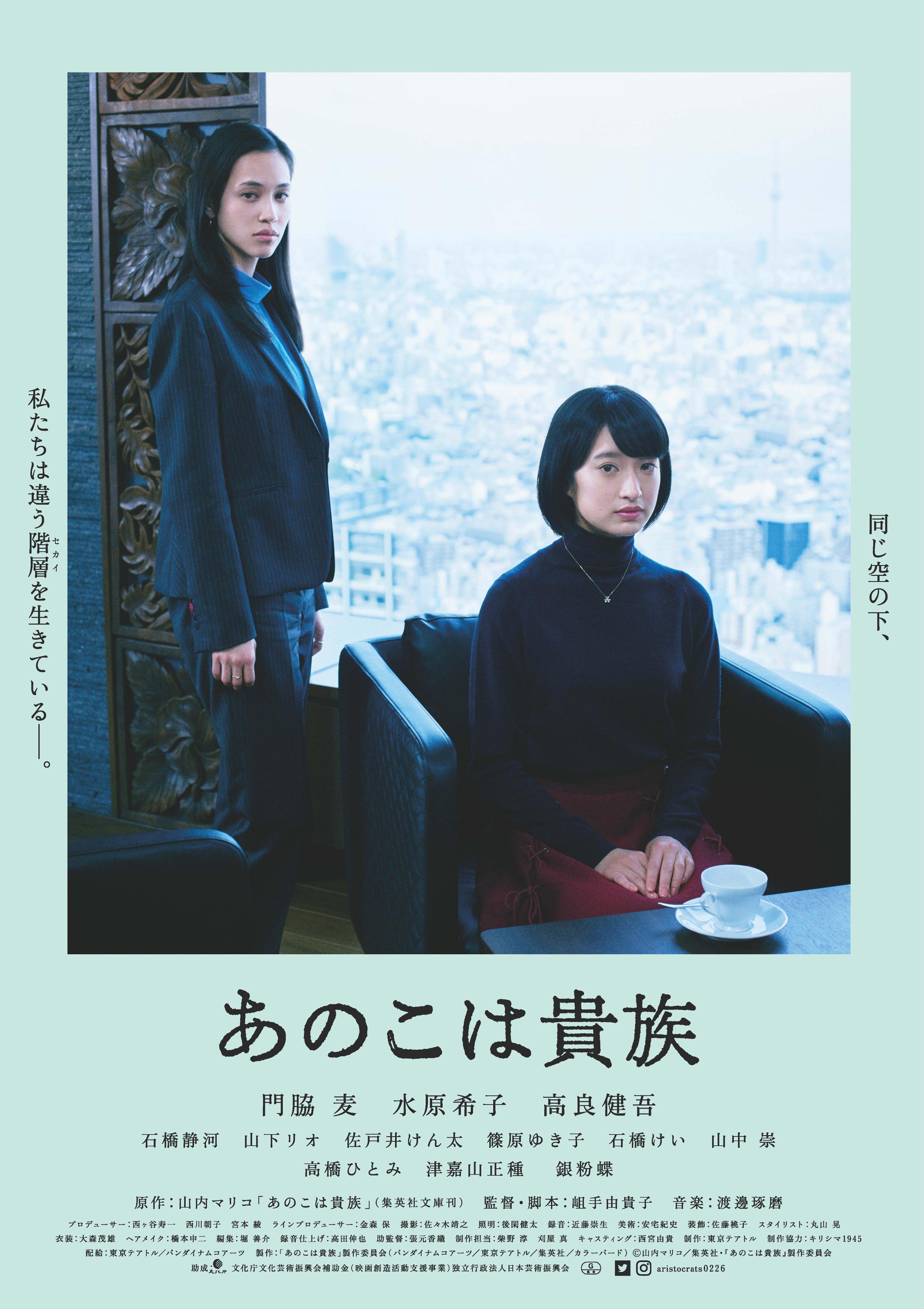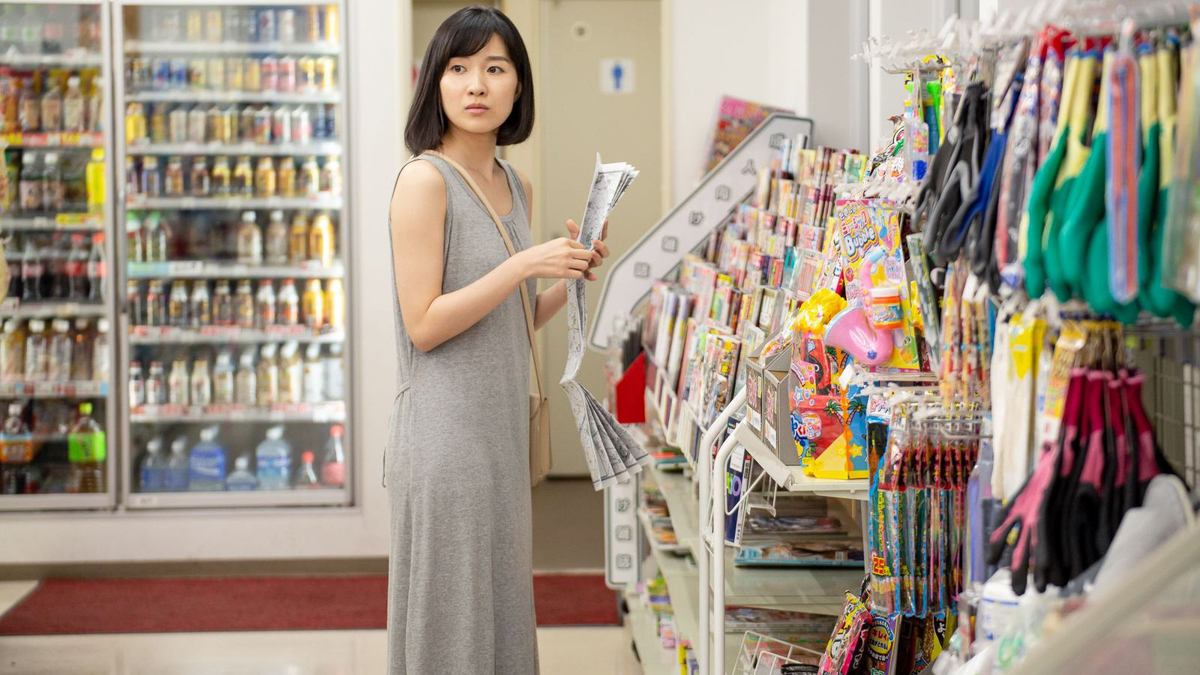“Is that still a thing?” a young boy asks incredulously of his rather severe grandmother as she quite insensitively sets up new marriage meetings for her granddaughter seconds after being told that her fiancé has unilaterally ended their engagement earlier that day. The “aristocracy” might seem like something from a bygone age, yet as those of us living in highly stratified societies can attest it continues to place a near invisible stranglehold over the mechanisms which govern our lives. Even so, the system traps all as Yukiko Sode’s sensitive drama Aristocrats (あのこは貴族, Ano Ko wa Kizoku), adapted from the novel by Mariko Yamauchi, makes plain as two women involved with the same man, as dejected and unhappy as either of them, eventually find common ground in attempting to seize their own agency from within a fiercely patriarchal society.
At 27, Hanako (Mugi Kadowaki) is beginning to feel as if her life is slipping away from her. As we first meet her, she’s on her way to a posh New Year meal at a fancy Tokyo hotel. The taxi driver envies her, lamenting that he drives people here all the time but has never set foot inside. The reason she’s running late, however, is a mild sense of embarrassment as evidenced by the empty chair at her side intended for the fiancé who won’t be coming. Explaining that he broke off the engagement because the timing was bad, Hanako attempts to put a brave face on the apparent shame she seems to be feeling while her sisters and mother suggest it might be for the best, he was a little too “flamboyant” and in any case they’re ideally looking for someone suitable to take over the family medical practice. While everyone is busy proposing alternative matches, only Hanako’s brother-in-law (Takashi Yamanaka) bothers to ask her what it is she really wants but all she can muster is that she’d be fine with someone “normal”.
After a few miserable omiai meetings with dreadful men from an awkward doctor with a photo fetish to a sleazy playboy salaryman who thinks women only say they like jazz because at some point a guy liked it, Hanako begins to lose the will to live thinking perhaps that looking for the “right guy” might be aiming too high and she should just take the best offer on the table. When she meets Koichiro (Kengo Kora), however, it’s love at first sight. Showing up like Prince Charming he’s handsome, poised, softly spoken, and even posher than she is. Hanako is the perfect choice to be his wife essentially because of her innate blandness. She’s everything the society wife is supposed to be, quiet, reserved, and unassuming in her total obedience to the tenets of her “upbringing”.
Meanwhile, Koichiro has also been in a longterm non-relationship with another woman, Miki (Kiko Mizuhara), a bar hostess from a small town who has had to struggle the whole way to make a life for herself. The pair first met at Keio University, but Miki was forced to drop out before graduating when her father lost his job despite having studied her socks off just to get a place. A member of the “in-crowd”, Koichiro’s acceptance was guaranteed because he attended an affiliated school filled with the children of the rich and powerful. Mirroring Hanako’s lunch date with her society ladies, we see Miki and her friend invited by a couple of upperclass classmates to a fancy afternoon tea only to gorp at the menu and its exorbitant price list at which the “in-crowd” do not even glance. When they meet again 10 years later and Miki explains she didn’t exactly choose her line of work, Koichiro laments it’s exactly the same for him, which it of course isn’t, but he is in a similar way trapped.
“I just want my family to continue” he later explains to Hanako, “it’s just how I was brought up. The same reason you married me”. In a certain way, Koichiro was no more free than Miki, ironically feminised reduced to his capacity to perpetuate the family line while aware that his whole life has been mapped out for him since the day he was born. He went to Keio, married a suitable woman, and is expected to run for political office. Hanako married him because she was expected to marry someone and it was undoubtedly a good match, yet she’s unhappy because the relationship is devoid of intimacy while her in-laws ironically pressure her about the lack of an heir. She suggests getting a job for something to do, but asking her brother-in-law for advice is reminded she’d need to talk to her husband and family first.
Hanako’s friend, fellow aristocrat and concert violinist Itsuko (Shizuka Ishibashi), meanwhile has remained quite defiantly single explaining to Miki whom she’d met by chance that she believes a woman should be financially independent partly because her mother had wanted to leave her father who had several affairs and numerous illegitimate children but couldn’t because she had no way to support herself, upperclass women largely being brought up to be the wives of important men. As she tells Miki, she hates society’s tendency to pit women against each other and isn’t here to judge her about her relationship with Koichiro but merely to talk. Rather than a bitter love triangle what arises between the women is a sense of solidarity, each finding common ground in being victims of a patriarchal society even if their “upbringings” and social status are currently very different. While Miki perhaps admires from afar but does not particularly resent the “in-crowd”, Hanako begins to see the various ways her “upbringing” has trapped her, attracted by Miki’s sense of confidence and independence remarking that her life seems “lived in”, struck by the warmth of the photos she has on her wall of various trips with friends.
Her mother had told her to “close her eyes to some things and try to get along” hearing the sad tale of a woman who managed to escape the golden prison of the aristocracy but only at the cost of her child, a cruelty Hanako had been too naive to consider. As Itsuko had told her, Tokyo is a compartmentalised city where you only meet members of your own social class, yet through her accidental contact with Miki she begins to realise another life is possible even if not quite shaking off her privilege as she rejects the tenets of her upbringing to seize her own agency while Koichiro remains trapped within the feudal legacy unable to free himself of the outdated notions of filial responsibility. A tale of cross-class, female solidarity, Aristocrats takes aim at the ironic equality of a system which damages all, even if some remain wilfully complicit, while affording the ability to its protagonists to sidestep the forces which constrain them to claim their own freedom brokered by mutual support and the aspiration towards a freer society.
Aristocrats streams in Germany until 6th June as part of this year’s Nippon Connection.
International trailer (English subtitles)










 Every keen dramatist knows the most exciting things which happen at a party are always those which occur away from the main action. Lonely cigarette breaks and kitchen conversations give rise to the most unexpected of events as those desperately trying to escape the party atmosphere accidentally let their guard down in their sudden relief. Adapting his own stage play titled Trois Grotesque, Kenji Yamauchi takes this idea to its natural conclusion in At the Terrace (テラスにて, Terrace Nite) setting the entirety of the action on the rear terraced area of an elegant European-style villa shortly after the majority of guests have departed following a business themed dinner party. This farcical comedy of manners neatly sends up the various layers of propriety and the difficulty of maintaining strict social codes amongst a group of intimate strangers, lending a Japanese twist to a well honed European tradition.
Every keen dramatist knows the most exciting things which happen at a party are always those which occur away from the main action. Lonely cigarette breaks and kitchen conversations give rise to the most unexpected of events as those desperately trying to escape the party atmosphere accidentally let their guard down in their sudden relief. Adapting his own stage play titled Trois Grotesque, Kenji Yamauchi takes this idea to its natural conclusion in At the Terrace (テラスにて, Terrace Nite) setting the entirety of the action on the rear terraced area of an elegant European-style villa shortly after the majority of guests have departed following a business themed dinner party. This farcical comedy of manners neatly sends up the various layers of propriety and the difficulty of maintaining strict social codes amongst a group of intimate strangers, lending a Japanese twist to a well honed European tradition.